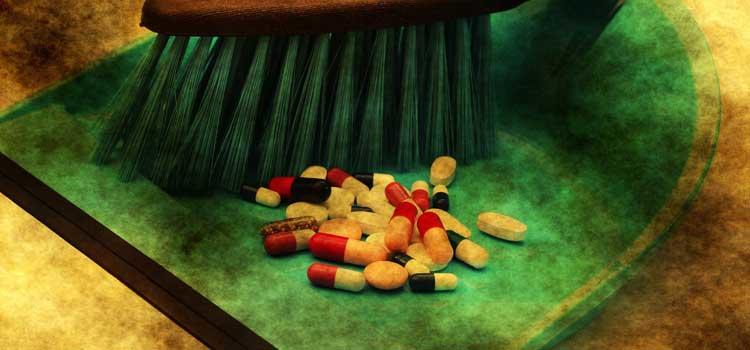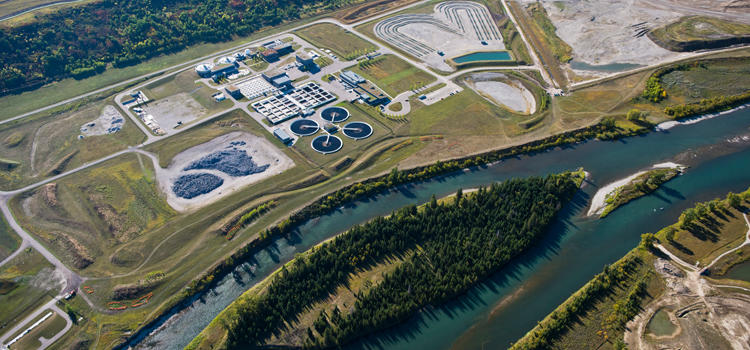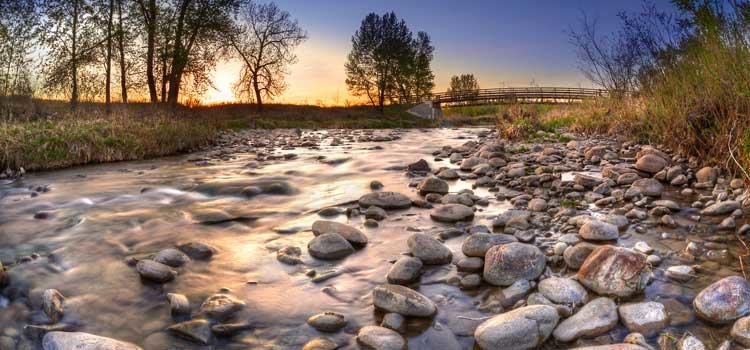
.
Nov. 6, 2016
In 2014, Alberta pharmacies collected more than 71 tonnes of expired and unused medications for disposal. That’s the equivalent of 36 minivans worth of pharmaceuticals that were diverted from our rivers, streams and landfills – in just one year.
Knowing that many more tonnes of “dead drugs” are flushed down the toilet or thrown into the garbage each year, the University of Calgary is embarking on a pilot program with local retailer Calgary Co-op to help divert more of those pharmaceuticals from being flushed down the drain.
The initiative is a nifty bit of “citizen science”: in this case, Calgarians learn more about how they can help protect the environment, while actively participating to keep the water clean.

.
Most pharmacies already accept old or unused medicines, vitamins and over-the-counter products for environmentally safe disposal through the Alberta Pharmacists’ Association’s ENVIRx Program. But Dr. Lee Jackson, PhD, UCalgary biological science professor, came up with the idea of partnering with local pharmacies to see what could be done to help non-scientists learn more about the problem, and also to mitigate environmental impacts.
The pilot program, which launches in January 2017, features an awareness campaign and prominently placed collection containers in six Calgary Co-op pharmacies – one in each quadrant of the city, along with two others outside the city.
Mark Elderkin, Co-op pharmacy operations manager, says participation in the program is simple. “People just have to dump the pills into a re-sealable plastic bag at home, then put the bag into a sealed and locked collection container at the pharmacy. The containers are then incinerated in an approved facility in Northern Alberta.
"Our goal is to facilitate the collection of dead drugs while educating our members on proper disposal methods," he adds.
While they’re not sure what to expect with this higher-profile approach, both UCalgary and Calgary Co-op believe commitment to community will fuel the program’s success. Says Jackson, “It’s a great way to engage the public as we try to increase awareness and literacy for water issues, and translate highly technical information in a way that engages the public.”
The Urban Alliance is a strategic research partnership forged in 2007 between the University of Calgary and The City of Calgary. Together researchers and city planners tackle important issues concerning transportation, waste reduction, energy and environment, youth crime, homelessness, poverty reduction and the integration of immigrants into our communities.
Sharing research between the city and the university benefits all our communities. As an example, Calgary’s Advancing Canadian Wastewater Assets’ (ACWA) state-of-the-art research facilities are embedded within the Pine Creek Wastewater Treatment Centre. Scientists and municipal wastewater treatment plant operators work together to study treatment technologies and look for ways to ensure clean water for everyone – including aquatic life and communities downstream.

.
“The Urban Alliance is a wonderful partnership,” says Dr. Anne Katzenberg, PhD, associate vice-president of research, and professor of anthropology and archaeology at UCalgary. “It formalizes the good relationship we have with The City, and offers opportunities for university researchers to solve important real-world problems.”
“We were collaborating informally with The City before 2007,” adds Barry Phipps, Urban Alliance co-ordinator, “and in 2007 we decided to take research to a more strategic level. That’s when we formed the formal partnership, to try to address complex, multidisciplinary, cross-silo issues.
“We want to be good citizens together.”
Phipps says the Urban Alliance has taken on well over 200 research initiatives and projects since it was established. As well as ACWA’s work, projects have included establishing a City-supported on-campus professorship in urban transportation, research on attitudes toward self-driving, or autonomous, vehicles, and studying traffic patterns on Deerfoot Trail to inform future transportation planning.
“Any major city grapples with transportation: how do we design road transportation and transit to be more efficient and effective, reducing greenhouse gases and creating safer ways of getting around, with minimal impact on neighbourhoods?”
Another Urban Alliance initiative is makeCalgary, an interdisciplinary, community-based research platform in the Faculty of Environmental Design (EVDS). It brings researchers and graduate students from multiple faculties, including Medicine, Social Work and Environmental Design, together with the City of Calgary, community partners and industry professionals, to design the city's future.

.
makeCalgary's activities are organized around a series of themes that define a great city, which have included health, resiliency, vibrancy and equity. The current theme is "makeCalgary Walkable."
There’s been plenty of talk in Calgary lately about alternative living spaces, and most recently, makeCalgary has made the news for its laneway house project. As well, researchers have been busy working on projects such as increasing commuter cycling, making Calgary more adaptable to unexpected change such as weather events, building vibrant civic places, and making our city accessible to everyone.
Get John Brown talking about walkability and the work makeCalgary has done so far in community-based research, outreach and education on the topic – and he’s off and running. Brown, dean of EVDS and co-chair of the walkCalgary platform, is an unabashed booster for making our city a more walkable, healthy, active place.
“One of the clearest indications of public health,” Brown says, “is the walkability of a city. When you build a city for people who are not in cars, there’s both personal and public health benefits. It’s safer, because there are more people on the street. It builds community, because you get more of a personal connection to others when walking.
“Walking should be a means to an end, not an activity on its own. You must have a city that’s structured to accommodate that – and it also means you’re not driving, which has sustainability and economic benefits. A walkable city doesn’t just happen; we need to look at how to create the city we all want to live in.”
So how do you retrofit Calgary, a sprawling, car-centric city, to be more walkable?
It can be done, says Brown, citing walkable cities like Tokyo, London, Barcelona, New York City, Toronto, Vancouver, and Melbourne. “Twenty years ago, Melbourne and Vancouver were not walkable cities,” Brown says. “Vancouver, for example, integrated residential density into industrial areas, and now it’s one of the world’s most walkable cities.”
And here’s some exciting news: in 2017 the university will host Walk21, an international conference where urban planners, physicians and public health providers, transportation engineers, architects, researchers and students join to discuss and share best practices on city walkability.
“We are the first academic institution to host this conference,” says Brown, “and it’s a great opportunity to bring the university and the city together around an issue that impacts all citizens. There will be lots of sessions in community centres, so the public can also participate.”
Another role the university plays in shaping the city starts on campus: UCalgary’s Leadership and Student Engagement Office helps students get connected with the larger community off-campus. Says Erin Kaipainen, manager of leadership and student engagement, “There are lots of opportunities for students to get in-depth exploration of critical issues. Students come out of these experiences with more questions – and with an increased understanding of issues in their community.”
These opportunities are optional, and all are student-funded. For example, Brittany Vine, a BA Development Studies Honours and Co-op student in 2014, began participating with the ucalgarycares program in her first year of studies. Vine volunteered with Homelessness at Home, a reading week program that partners with the Mustard Seed. Student volunteers learn about homelessness and mental health issues in the most vulnerable of their fellow citizens.
“I was looking for community to connect and partner with in Calgary,” says Vine. “People who are passionate about the same sorts of things as I am – people I might not otherwise have connected with.”
Participating in this program, as well as in a number of other ucalgarycares initiatives over her educational career, led Vine to a Master’s in Education in Community Engagement at an American university, and finally to her current job as the community engagement manager at the Mustard Seed. Her department oversees the ucalgarycares program from the Mustard Seed perspective – so she’s come full circle.
“The program helped in my journey as a student,” she says, “and I’ve grown as a person. It helped me define what service is, and how to get involved in mutually beneficial ways.”
Dr. Lee Jackson is a professor of Ecology and Evolutionary Biology in UCalgary's Faculty of Science and scientific director of Calgary’s Advancing Canadian Wastewater Assets (ACWA) research initiative. His research interests centre on processes that affect the stability of aquatic communities and ecosystems, and relationships between sustainable growth and water quality and quantity. View a list of Lee's academic papers
John Brown is dean and a professor of architecture with the University of Calgary’s Faculty of Environmental Design. His research interests include housing, aging-in-place, and architectural entrepreneurship. John is a registered architect and a founding principal of the architectural firm Housebrand. He is a recognized authority on residential practice and collaborates with medical and bio-medical engineering researchers to develop new housing options for an aging population. Learn more about John Brown